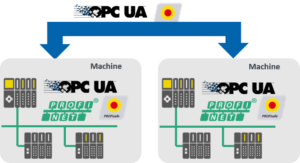Within just a short period of time, the joint working group between PI (PROFIBUS & PROFINET International) and the OPC Foundation has managed to draft a review version of the specification “Safety over OPC UA Based on PROFIsafe” for controller-to-controller communication. The crucial steps in the fundamental design and detailed specification development have thus been accomplished.
The project began at SPS IPC Drives 2017 with a memorandum of understanding based on the joint understanding between PI and the OPC Foundation. The respective strengths of these two entities – both in terms of technology and market penetration – needed to be brought together in order to ensure fully reliable controller-to-controller communication.
After establishing a joint working group consisting of reputable companies and organizations, the experts for functional safety quickly recognized the key parameters and boundary conditions: The proven protocol security mechanisms (e.g. CRC, codenames, monitoring numbers, watchdog monitoring and the SIL monitor) can be adopted. However, adjustments are necessary for the state machines, the protocol datagrams, and the initialization, since controllers with equal rights now communicate with each other, rather than a controller communicating with subordinate field devices.
Additionally, against the background of Industry 4.0, the support of flexible system structures with changing communication partners are of crucial significance for the acceptance of the standard. This has now been resolved. Safety over OPC UA will support any network topologies (line, star, ring, etc.), while – in principle – connections can also be set up or dismantled at runtime. A given interface can be used alternatingly by different partners. Thus devices such as modular machines, automated guided vehicles (AGVs), autonomous mobile robots (AMRs) and tool changers, etc. will benefit. In contrast to today’s functional safety communication protocols, participants no longer have to know all of the others already at the configuration stage. This makes it possible, for example, to add a new mobile robot to a facility without having to reconfigure all of the existing machines.
The corresponding draft of the specification has been prepared, and committees can begin the review. An initial trial implementation was featured as a proof of concept at the PI joint stand at SPS IPC Drives 2018.
This once again shows that the combination of proven, leading technologies and collaboration between strong organizations results in workable solutions. PI (PROFIBUS & PROFINET International) is open for further steps.
For more information download the full press release Here

